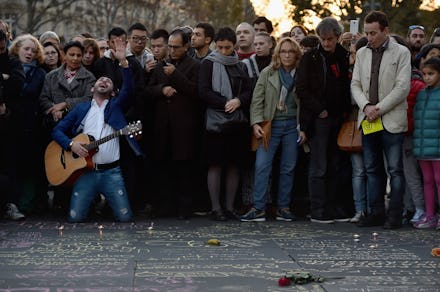Bono Calls Paris "First Direct Hit on Music," But These Attacks Are Part of a Long History

Following Friday's attacks that left at least 129 dead — 118 in the Bataclan club, where the Eagles of Death Metal were playing a set — Paris has shuttered performance venues across the city. It forced major rock acts, including U2, Motorhead and the Foo Fighters, to cancel tour dates. The city's famed concert halls fell silent for two days.
"If you think about it, the majority of victims last night are music fans," Bono said Saturday in a phone interview with radio host Dave Fanning. "This is the first direct hit on music that we've had in this so-called war on terror. And it's very upsetting. These are our people."
To say all these lives were lost in the name of music oversimplifies the reality to a significant extent. This was an attack on people, on Western cultural ideals. Terrorists targeted a soccer stadium as well as two restaurants and two other markets. In a statement claiming responsibility for the attacks, ISIS does make special mention of the Bataclan, singling it out as a "theatre for exhibitions, where hundreds of pagans gathered for a concert of prostitution and vice."
If anything, this targeting speaks to music being a powerful representation of freedom and spiritual liberty. In its ongoing activities, ISIS has a history of targeting musicians, and manipulating a people's sounds seems an integral part of their work to subdue the regions they target.
This year has seen numerous attacks on music in ISIS-controlled territories. In January, ISIS religious police delivered 90 lashes to four young musicians who were caught with instruments the terrorist group deemed "offensive to Muslims," including an electric keyboard and lute. ISIS shared images and video of the public punishment and the smashed instruments, broadcasting them via their media channels.
In February, the terrorist group burned a pile of "un-Islamic" drums in Libya. In April, ISIS soldiers burned the piano of celebrated musician Aeham al-Ahmad, who played with a group called the Youth of Yarmouk. They called playing it a "sin," according to CNN.
"They burned it in April, on my birthday. It was my most cherished possession," al-Ahmad told the Agence France-Presse, according to the Daily Star. "The piano wasn't just an instrument. It was like the death of a friend."
This interpretation of music being a sinful act is not unique to ISIS. It's an extreme example of a debate that's been going on for centuries in Islamic cultures. The religion's canonical texts offer contradictory statements about the permissibility of music, however many extremist religious groups have banned the practice. Radical Islamic military groups associated with al-Qaida banned music in the territories they controlled in Mali between 2012 and 2013, as a means to crush the country's culture. Their expulsion from the Malian city of Gao in January 2013 by French and Malian forces prompted dancing in the streets. The Taliban banned music altogether while they were in full control of Afghanistan.
"Religious leaders are of the view that this is lust, which turns you away from social and religious responsibilities," Akhtarul Wasey, professor and director of the Zakir Husain Institute of Islamic Studies at Jamia Millia Islamia University in New Delhi, told the New York Times. "For a religious leader, whether it's listening to or learning music, it's not permissible inside or outside your house. The overwhelming majority of Islamic scholars are against music."
Yet even though ISIS has gone out of its way to stamp out musical expression during its campaigns, the group clearly understands music's power to move people. In its recruitment videos, execution footage and other propaganda, ISIS frequently presents its messages over a sonic backdrop of nasheeds — jihadi songs that glorify bloodshed and holy war. They're generally a cappella, which helps distinguish them from most Western musical traditions. According to scholars familiar with the nasheed tradition, ISIS use of the songs has apparently proved very effective in recruiting young extremists.
"If you are really trying to recruit and indoctrinate people, music is a fantastic way to do it," Phillip Smyth, a Middle Eastern affairs researcher at the University of Maryland told Mother Jones. "It's like Wagner being set to Apocalypse Now."
The attacks in Paris were aimed at a lot more than music. However, for an organization determined to undermine all its enemies' cultural ideals, music presents a powerful target.
Fittingly, in responding to Friday's terror, many of the most arresting tributes commemorating victims in Paris have come in a musical form. Saturday, German pianist Davide Martello rolled a grand piano out in front of the Bataclan club to play a rendition of John Lennon's famous peace anthem "Imagine." A guitarist in Paris' Place de la Republique sang Leonard Cohen's "Hallelujah" all day Sunday to commemorate the victims. Crowds chose this same song, which features the pointed lines "Nothing to kill or die for/ And no religion too," following attacks on the offices of satirical newspaper Charlie Hebdo earlier this year.
During times of such unimaginable tragedy, the world cannot afford to let music die. Composer Leonard Bernstein's immortal words following the death of John F. Kennedy present perhaps the best path we can turn to in moving forward. "We musicians, like everyone else, are numb with sorrow at this murder, and with rage at the senselessness of the crime," he said in a speech delivered in 1963. "But this sorrow and rage will not inflame us to seek retribution; rather they will inflame our art. Our music will never again be quite the same. This will be our reply to violence: to make music more intensely, more beautifully, more devotedly than ever before."